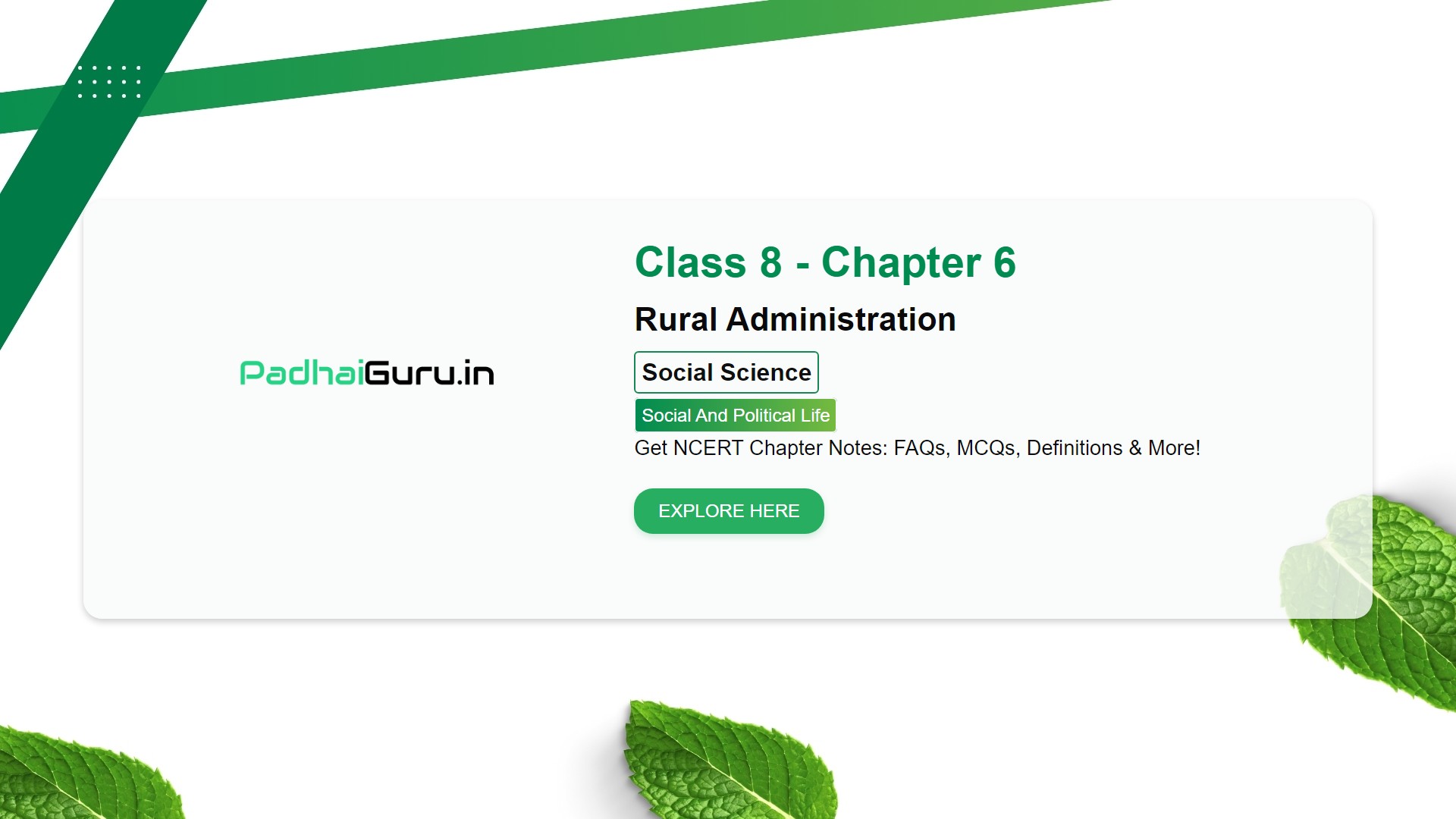06. Rural Administration Political Science Class 8 Chapter 6 Notes

06. Rural Administration Political Science Class 8 Chapter 6 Notes
Introduction to Chapter
The chapter titled "Confronting Marginalisation" explores how marginalised groups in India, such as Dalits, Adivasis, and religious minorities, fight against inequalities and discrimination. It discusses their struggles and the strategies they employ to achieve their rights. It emphasizes the role of the Constitution and laws as tools for these groups to demand equality and justice in a democratic society.: .,
Invoking Fundamental Rights
The chapter explains how marginalised groups claim their Fundamental Rights to demand equality and justice. Through these rights, they invoke the government’s recognition of injustices faced by them.
- Fundamental Rights are crucial for ensuring equality among all citizens.
- Dalits and Adivasis use these rights to challenge discrimination.
- Article 17 abolishes untouchability, allowing Dalits to access public services.
- Article 15 prohibits discrimination based on religion, race, caste, and sex.
- Marginalised groups can approach the courts to enforce these rights.
- The Constitution acts as a protective shield for these communities.
- Activism often leads to the creation of new laws to enhance their rights.
- Examples :
An example includes Dalits utilizing Article 17 to protest against social exclusion and having the law enforce their rights to education and public access.,
Laws for the Marginalised
The chapter discusses specific laws and policies designed to support marginalised communities, emphasizing the government’s role in creating instruments that promote social equity.
- Policies are developed to uplift Dalits and Adivasis through various means.
- There are set schemes that directly benefit these communities, often informed by surveys.
- Legal frameworks such as the Prevention of Atrocities Act aim to protect against discrimination.
- Mandatory reservations in educational institutions help integrate marginalised individuals.
- Special scholarships are provided to empower students from these communities.
- The government aims to facilitate their access to essential services.
- Building awareness about these laws is necessary for effective implementation.
- Examples :
For instance, the government provides scholarships and educational hostels for Dalit students to promote their access to education.,
Promoting Social Justice
Social justice initiatives highlight specific government schemes aimed at supporting marginalised communities and ensuring their rights are applied in practice.
- The reservation policy ensures representation in education and jobs.
- Scheme implementation focuses on regions with high populations of Dalits and Adivasis.
- Projects are designed to ensure equitable development opportunities.
- Such policies are vital for dismantling historic inequalities.
- Positive discrimination is seen as a tool for addressing historical injustices.
- The central and state governments collaborate to implement these schemes.
- Awareness and education about these schemes enhance their effectiveness.
- Examples :
The government runs initiatives that provide training and skill development for Adivasis to ensure employment opportunities.,
Protecting the Rights of Dalits and Adivasis
The chapter details protection mechanisms established to combat discrimination against Dalits and Adivasis and to enforce their rights.
- Specific laws safeguard against various forms of violence and discrimination.
- The 1989 Act provides a legal basis for Dalits to seek justice against atrocities.
- Activist movements have historically led to the establishment of these laws.
- Community awareness is vital for the laws to effectively protect rights.
- Implementation issues often hinder the efficacy of these laws.
- Support from civil society organizations is crucial for advocating these rights.
- Documentation of violations is necessary for legal redress.
- Examples :
Rathnam’s case is an illustration of using legal frameworks to fight back against oppressive social norms.,
The Scourge of Manual Scavenging
This section addresses the ongoing issue of manual scavenging, a practice that reflects deep societal inequalities and challenges associated with caste-based discrimination.
- Manual scavenging involves cleaning human waste and is often relegated to Dalits.
- Workers face hazardous working conditions and low pay.
- The practice continues despite existing legal prohibitions against it.
- Economic dependency reinforces this degrading practice.
- Government intervention is required for rehabilitation.
- Public awareness about this issue is crucial for its eradication.
- Advocacy movements highlight the plight of manual scavengers.
- Examples :
The PIL filed by the Safai Karamchari Andolan serves to draw attention to the ongoing violations of rights pertaining to manual scavengers.,
Adivasi Demands and the 1989 Act
The chapter illustrates Adivasi resistance against land dispossession, advocating for policies and protections afforded to them under the law.
- The 1989 Act is pivotal for protecting the land rights of Adivasis.
- Encroachment on tribal lands is a significant issue.
- Activists like C.K. Janu stress the rights guaranteed within the Constitution.
- Law enforcement is critical for addressing unlawful seizure of lands.
- Government policy formulation is essential to ensure rehabilitation of displaced Adivasis.
- Rights recognition processes are integral to their survival and development.
- Community mobilization is key in asserting these rights.
- Examples :
Activists have successfully used the 1989 Act to reclaim ancestral lands for Adivasi communities.,
Conclusion
The conclusion reiterates the importance of continuous efforts to ensure rights and equitable treatment for marginalised groups. It emphasizes the need for vigilance, advocacy, and ongoing struggle to transform laws into practical realities that foster dignity and equality.
Keywords and Definitions:
- Fundamental Rights: Basic rights enshrined in the Constitution to ensure equality and justice for all citizens.
- Reservation Policy: A system that allocates a certain percentage of seats in education and jobs for marginalized communities.
- Discrimination: Unfair treatment of individuals based on characteristics such as caste, race, or gender.
- Untouchability: A social practice that discriminates against certain castes in India, now illegal under the Constitution.
- Marginalisation: The process by which certain groups are pushed to the edge of society, receiving less power, opportunities, or rights.
- Act: A law passed by the legislature.
- Adivasis: Indigenous people in India with distinct languages and cultures, often residing in forest areas.

